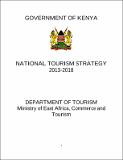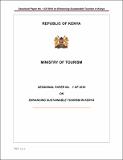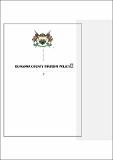| dc.contributor.author | Ikiara, M Moses | |
| dc.coverage.spatial | Ministry of Tourism | en |
| dc.date.accessioned | 2023-01-25T12:08:36Z | |
| dc.date.available | 2023-01-25T12:08:36Z | |
| dc.date.issued | 2004 | |
| dc.identifier.uri | https://repository.kippra.or.ke/handle/123456789/4050 | |
| dc.description.abstract | Tourism is a leading
economic activity in
Kenya, being the third
largest foreign exchange earner
after tea and horticulture. Since
1990, particularly since the
second half of the 1990s,
Kenya's tourism industry has
faced enormous challenges,
including decline in per capita
spending, average length of
stay, hotel occupancy rates,
hotel room rates and service
quality. Some of the factors that
have contributed to this decline
in tourism growth include
environmental degradation and
deterioration in the quality of
tourism products due to mass
tourism. | en |
| dc.language.iso | en | en |
| dc.publisher | The Kenya Institute for Public Policy Research and Analysis (KIPPRA) | en |
| dc.relation.ispartofseries | Discussion Brief Issue;No. 02 of 2004 | |
| dc.subject | Tourism | en |
| dc.subject | Environment | en |
| dc.subject | Environmental Management and Coordination | en |
| dc.subject | Environmental Conservation | en |
| dc.subject | Tourism Development | en |
| dc.title | Discussion Brief Issue No. 02 of 2004 on Impact of Tourism on the Environment in Kenya | en |
| dc.type | Other | en |
| ppr.contributor.author | The Kenya Institute for Public Policy Research and Analysis (KIPPRA) | en |




